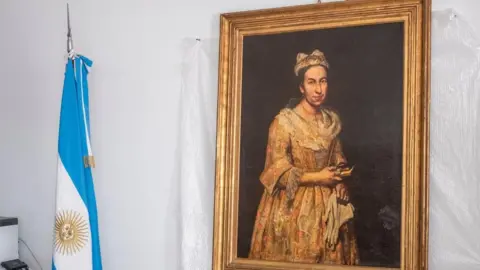In a haunting reminder of one of the darkest chapters in European history, the Srebrenica massacre's legacy still looms large 30 years later. The events of July 1995, during which over 8,000 Bosnian men and boys were killed by Bosnian Serb forces, are marked by unresolved grief and persistent division in modern Bosnia and Herzegovina.
During the compelling stage adaptation at Sarajevo's War Theatre titled "Flowers of Srebrenica," performers and audience members experience a heart-wrenching depiction of the trauma and sorrow that has shaped the lives of many Bosnian families. The production resonates deeply with those familiar with the real-life horrors, embodying decades of anguish since the infamous massacre.
Srebrenica remains the most egregious war crime committed on European soil since World War II, where thousands, believing they were under UN protection, fell victim to the onslaught of Bosnian-Serb forces led by General Ratko Mladić. Dutch peacekeepers, rather than intervening, stood by as men, women, and children were forcibly separated—men and boys murdered, women dispatched elsewhere, the innocence of hope tragically shattered.
The bloody legacy extends beyond the massacre itself; the perpetrators’ gruesome tactics included the removal and reburial of victims' remains to erode the evidence of their crimes. Consequently, many families continue to seek closure, with DNA testing helping some identify their deceased relatives. Yet, the ongoing anguish is compounded by political divisions in Bosnia and Herzegovina, as seen through the lens of the recent theatrical portrayal.
While voices across the state commemorate the tragedy, in the predominantly Serb entity of Republika Srpska, the narrative diverges sharply. Key political leaders reject acknowledging the genocide, despite documented proof in international courts. Selma Alispahić, the lead actress of the play and a former refugee, voices the collective exasperation felt towards denialism, emphasizing that misremembering serves only to enrich those who foment discord.
Political tensions are on the rise as Milorad Dodik, president of Republika Srpska, challenges the unity of Bosnia’s institutions and revives dark rhetoric reminiscent of the past. His attempts to withdraw from national governance and establish an independent police force have raised alarms, invoking fears of instability that harken back to the conflicts of the 1990s.
The stark contrast of Saturdays in Sarajevo—where hundreds gather to honor the victims—against the muted observance in East Sarajevo illustrates the societal rift. Discussions about the past and the painful memories of the massacre often deeply fracture the country's fragile peace, with prominent politicians arguing that embracing the shared tragedy could foster unity.
Amidst this backdrop, the Srebrenica Memorial Centre and Potočari Cemetery remain vital spaces for reflection and mourning, with a growing number of supporters showing solidarity with Bosniaks. In a gesture of remembrance, citizens across the nation—a mosaic of diverse ethnicities—come together to honor the lost lives, reinforcing a message of hope amidst the darkness.
For many, the memories of Srebrenica and its aftermath catalyze concerns for the future, as rising ethno-political tensions threaten to unravel progress made over the past three decades. The echoes of the past reverberate through today’s Bosnia as calls for accountability and remembrance clash with the deafening silence of denial, impacting both the collective conscience and the path toward peace.




















